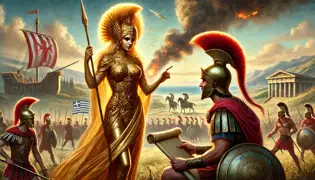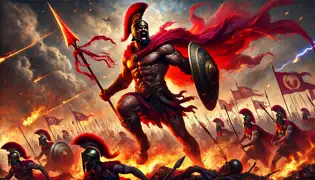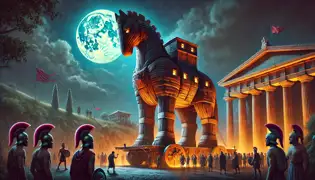In the dawn of Greek mythology, Olympus stood as the throne of divine power, a majestic realm where gods and goddesses observed and intervened in mortal affairs. Among the Olympians, two deities were often at odds: Athena, goddess of wisdom, strategy, and reason, and Ares, god of war, destruction, and unrelenting aggression. Their rivalry was both a cosmic ballet and a mirror reflecting humanity’s struggle between intellect and impulse.
This is their tale, not just as gods but as forces shaping the destiny of mortals and the balance of the cosmos. Athena’s birth alone was a testament to her role as a symbol of intellect and strategy. She emerged fully grown and armored from Zeus’s forehead, a product of his mind rather than his loins, and thus became the embodiment of wisdom and disciplined power. Ares, meanwhile, was born of Zeus and Hera, inheriting the fiery temper of his parents. From his youth, he craved the chaos of battle and gloried in the visceral thrill of conflict. Their rivalry was not born of mere personality but of ideology. Athena represented the calculated mind, where planning and foresight ensured survival and victory. Ares, however, thrived on brute strength and unbridled passion, believing that true dominance was achieved through force alone. Their conflict was destined to play out in the mortal realm, where their opposing philosophies would influence countless generations. On a fateful day, Zeus summoned Athena and Ares to his great hall, where the council of the gods convened. A storm had been brewing in the mortal world: the conflict that would become known as the Trojan War. Mortal kings and warriors called upon the gods for guidance, and Zeus decided that Athena and Ares would each champion a side. “Athena,” Zeus said, his voice deep and commanding, “your wisdom is unmatched. You will guide the Greeks, for their quest is born of strategy and justice.” “Ares,” Zeus continued, turning to his son, “you will stand with the Trojans, for their valor and ferocity are unmatched.” Ares smirked, eager for the bloodshed. “Let the mortals decide their fate through strength!” he declared. Athena, ever composed, responded with measured words. “Strength without strategy is like a ship without a rudder. I shall guide the Greeks to victory, not through slaughter, but through cunning.” The two deities descended to the mortal world, their rivalry casting a shadow over the Trojan War. The Trojan War raged for years, fueled by the gods’ influence. Athena chose to work subtly, whispering strategies into the minds of Greek commanders. She inspired the construction of fortifications, the formation of alliances, and the crafting of clever tactics. Odysseus, the cunning king of Ithaca, became her most devoted mortal ally. She appeared to him in dreams, her voice a beacon of wisdom. “Victory lies not in brute strength, Odysseus, but in wit and patience. The Trojan Horse shall be your path to glory.” Meanwhile, Ares reveled in the chaos of the battlefield. His presence ignited the hearts of Trojan warriors, driving them into frenzied charges. He stood alongside Hector, the noble prince of Troy, urging him to meet Achilles in a duel that would become legendary. “A warrior’s honor is forged in the heat of battle,” Ares told Hector. “Face your enemy and claim your place in history!” The gods’ actions led to victories and losses on both sides, but their motives were clear. Athena sought to end the war with minimal bloodshed, while Ares aimed to prolong it, feeding on the destruction and despair. After ten long years, the Greeks, under Athena’s guidance, crafted their masterstroke—the Trojan Horse. It was a vessel of deception, a seemingly peaceful gift that hid Greek soldiers within. Athena stood beside Odysseus as the horse was presented to the Trojans. “Patience, Odysseus,” she said. “The path to victory is not through the gates, but within them.” Ares, sensing the trap, attempted to intervene. He appeared in Hector’s dreams, warning him of deceit. But Hector, worn down by the years of war, dismissed the god’s words. The Trojan Horse was wheeled into the city, and that night, the Greeks emerged, opening the gates to their waiting army. The fall of Troy was swift and brutal, marking the triumph of Athena’s strategy over Ares’s brute force. Back on Olympus, the defeat weighed heavily on Ares. He stormed into Athena’s sanctuary, his eyes blazing with fury. “You play the mortals like puppets!” he shouted. “Where is the honor in deception?” Athena, unflinching, replied, “And you revel in needless carnage. Is that your legacy? A god of chaos with no regard for the lives you destroy?” Their argument shook the halls of Olympus, and Zeus intervened, his voice a thunderclap. “Enough! The mortals have chosen their path, and the war is done. You have both played your roles, but let this be a lesson: wisdom and strength must coexist, for one without the other leads to ruin.” Though their rivalry continued, Athena and Ares began to see the value in each other’s methods. During the Persian Wars, they found themselves working together, albeit reluctantly. Ares inspired the Greek warriors with his ferocity, while Athena guided their strategies, ensuring their efforts were not in vain. In one notable battle, Athena devised a plan to lure the Persian navy into a narrow strait, where their numbers would work against them. Ares, meanwhile, stood at the front lines, his presence bolstering the Greeks’ courage. Victory was achieved, and for the first time, the two deities acknowledged each other’s contributions. The rivalry between Athena and Ares endures, not as a conflict of animosity, but as a balance of forces. Athena tempers Ares’s fury with reason, while Ares reminds Athena of the power of raw emotion and courage. Their tale is immortalized in the hearts of mortals, who continue to grapple with the same struggles: the tension between intellect and passion, strategy and impulse, wisdom and strength. In every battle, in every triumph and tragedy, the influence of Athena and Ares is felt. They are not just gods of Olympus but symbols of humanity’s dual nature, forever intertwined in the tapestry of existence. As the sun sets over Mount Olympus, Athena and Ares sit in the throne room, watching the mortal world below. There is no need for words; their unspoken truce is a beacon of hope for humanity’s endless quest for balance. They are rivals, allies, and eternal forces shaping the destiny of gods and men alike. {{{3779}}The Seeds of Rivalry
The War Council of Olympus

The Trojan War: Athena’s Strategy vs. Ares’s Fury
The Turning Point: The Trojan Horse

The Gods’ Confrontation
A New Alliance
The Eternal Struggle

Epilogue: A Silent Truce


















